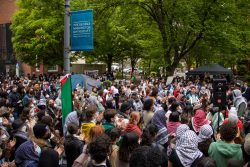“As a university we need to place ourselves on the cutting edge of change, to be part of this city’s historic quest for racial, social, economic and political justice,” said University President John J. DeGioia two days before his inauguration in 2001. On the eve of his Presidency, DeGioia committed himself to enacting social change. However, a year and a half later it is questionable whether he has followed through on his promise.
In 1999, Georgetown University students seeking better working conditions for workers making Georgetown apparel staged an 85-hour sit-in in the office of then-University President Leo J. O’Donovan S.J. At the time, President DeGioia was serving as Senior Vice President, overseeing University-wide operations including human resources.
The sit-in involved students from several Georgetown groups, led by the Georgetown Solidarity Committee, and resulted in more fair working conditions for those who make Georgetown apparel.
Once again, GSC is leading the campaign to change Georgetown’s relationship with its workers. The difference is the workers are the ones we see every day on campus. As recently as this November, GSC assisted a hospital workers’ union in reaching an agreement on a two-and-a-half year contract with MedStar’s management at Georgetown University Medical Center. That agreement resulted in a cancellation of the workers’ planned walkout. The two sides agreed not to subcontract union work, a practice that circumvents union wages.
Last month DeGioia strongly stated Georgetown’s commitment to affirmative action during a speech titled “Cracks in the Meritocracy,” calling the policy “critical to achieving our educational mission.” In his speech, the President discussed how the University’s policy is designed to reflect its commitment to “the demands of justice.”
Janessa Landeck (NUR ‘05) asked President DeGioia, “As we support affirmative action and a diverse student body and workforce, as a principle of social justice and the catholic ideal, don’t you also think that the individuals of different races and ethnicity’s should then be treated equally and compensated equally?”Landeck was referring to the fact that half the janitorial workers on this campus are paid around $12 per hour, receive health care benefits and enjoy job security, while the other half, who are mostly Latino, do the exact same work, get no medical coverage, have no job security and are paid between $7 and $8 per hour. This forces them to work 2 or 3 jobs, upwards of 70 hours a week, to make ends meet. They have no time to learn English, no opportunity to get an education and no chance for upward social mobility.
DeGioia responded by saying, “I’m not sure I have much more of a response to say, other than that I understand your position. It’s something that we study very carefully; we continue to study.” He added, “We understand that the concerns of the members of our workforce are important and significant to consider, and we’re very aware of the issues that you’ve identified.”
Since Pope Leo XIII’s release of Revum Novarum in 1891, the first papal edict to focus on the rights of workers, the Catholic Church has supported the rights of workers to secure their rights to fair wages.
As a Catholic university, Georgetown has a responsibility to apply the Church’s teachings to human resources practices on its campus. Georgetown hasn’t lived up to these directives, though, leaving workers to fight for a living wage.




